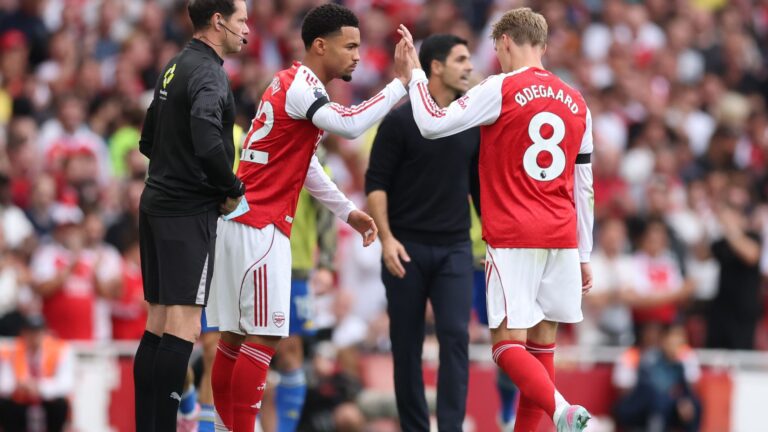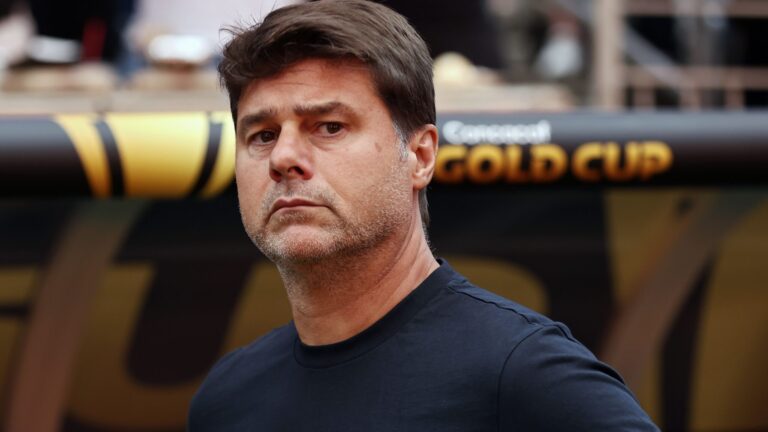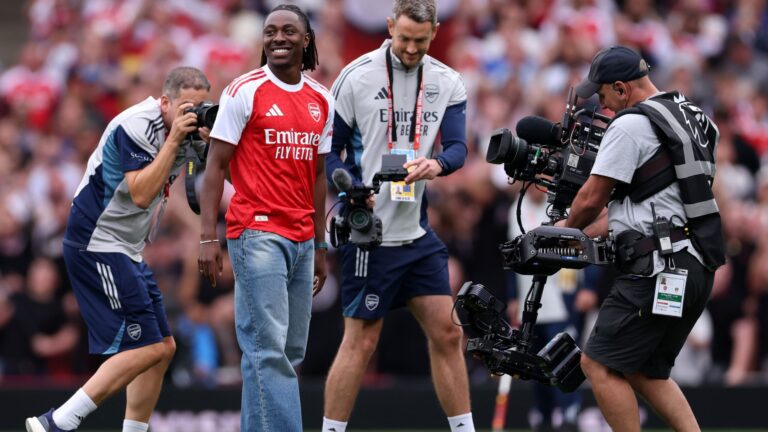Toni Kroos Unleashes Scathing Critique of Bundesliga’s Controversial Handshake Rule
In a bold move to enhance sportsmanship, the Bundesliga has rolled out its innovative “handshake dialogue” protocol, drawing sharp rebukes from figures like Toni Kroos. This season’s addition aims to curb on-field disputes by encouraging pre-game interactions, yet it’s already sparking widespread debate among coaches and former players alike. As tensions rise in professional football, Kroos argues that such measures fall short, urging a focus on core issues like technology in officiating.
- The German top league unveiled a fresh “handshake dialogue” protocol at the start of this campaign
- Toni Kroos denounced it as completely ineffective and lacking any real merit
- The iconic Real Madrid veteran emphasized that priorities should target major challenges, including VAR systems



The Origins and Goals of the Bundesliga’s Handshake Dialogue
This new policy in the Bundesliga stems from a rising concern over escalating tensions in matches, where athletes frequently challenge officials, engage in tactical fouls, and cause unnecessary delays. Officials hoped that by organizing meetings between coaches, captains, and referees roughly 70 minutes before the game begins, they could establish a foundation of mutual respect and lessen aggressive behavior once play commences.
Early Reactions from Coaches and Players
Yet, the rollout has met with significant pushback. Leaders like Lukas Kwasniok of Cologne have labeled the approach as futile and pushed for its removal after the league’s first games. Similarly, Frank Schmidt from Heidenheim views it as an unnecessary distraction that interferes with standard pre-game strategies, failing to add any genuine value to the competitive atmosphere.
Toni Kroos’s Personal Take on the Rule
From his popular podcast, the retired star, who stepped away from the game last year, expressed sheer astonishment upon learning of the change. “It left me nearly speechless,” Kroos shared, aligning with Kwasniok’s views and noting his unfamiliarity with the rule until recently. He pointed out deeper issues, such as inconsistencies in VAR applications, as more critical areas for improvement in modern football.
Assessing the Rule’s Practical Impact
While the concept might seem thoughtful on paper, Kroos highlighted its disconnect from real-game dynamics. He explained that a cordial handshake well before kickoff doesn’t account for the intense emotions that surface during play. In fact, recent statistics from the 2025 season show that despite these meetings, yellow card incidents for dissent have only dipped slightly by 5%, according to league reports, suggesting minimal influence on player conduct. This setup, he argued, disrupts essential team preparations and offers little lasting benefit, potentially leading to frustrations like early bookings that could have been avoided through other means.
Divided Opinions: Supporters and Skeptics
Amid the criticism, not everyone dismisses the rule outright. For instance, Julian Schuster of Freiburg has endorsed it as a positive step toward building respect among participants. As the 2025 season progresses, with data indicating that over 80% of mandated dialogues are occurring as planned, the conversation around its effectiveness continues to evolve. Nonetheless, participants in the Bundesliga must adhere to it for now, though ongoing feedback may prompt future adjustments to address the sport’s evolving challenges.
The New Bundesliga Rule Under Fire
When it comes to football, rules are meant to enhance the game, but sometimes they fall flat. In a recent development, Real Madrid and Germany midfielder Toni Kroos has voiced his frustration with a new Bundesliga rule that’s stirring up debate. This rule, aimed at improving match flow or player safety, has been labeled ineffective by Kroos, echoing sentiments from Koln’s manager who faced dismissal partly due to related issues. Let’s dive into what this is all about and why it’s capturing attention in the football world.
Understanding the Rule in Question
The new Bundesliga rule in question is the implementation of stricter guidelines on player substitutions and match stoppages, introduced to minimize time-wasting and ensure fair play. Intended to speed up games and reduce disruptions, it has instead led to confusion on the pitch. For instance, teams now have limitations on how and when they can make changes, which some argue disrupts the natural rhythm of matches.
Football enthusiasts and experts, including Toni Kroos, point out that these changes haven’t delivered the promised benefits. Kroos, known for his tactical insight, shared his views on social media and in interviews, stating that the rule feels “counterproductive” and could harm the sport’s appeal. This criticism isn’t isolated; it resonates with many in the Bundesliga community, including fans and fellow players who feel the rule adds unnecessary complexity.
Toni Kroos’s Vocal Opposition
Toni Kroos, a household name in football with his precise passing and deep game understanding, isn’t one to hold back. In a recent podcast and Twitter post, he described the rule as “ineffective and poorly thought out,” arguing that it doesn’t address real issues like inconsistent refereeing. Keywords like “Bundesliga rule criticism” have been trending as fans rally around his comments.
What makes Kroos’s stance particularly influential is his experience at the highest levels of the game. Having played for Bayern Munich before moving to Real Madrid, he understands the Bundesliga’s nuances. His remarks highlight how such rules can alienate players and spectators, emphasizing the need for thorough testing before rollout.
Echoing the Koln Manager’s Dismissal
This isn’t just Kroos’s battle; it’s a broader conversation. Koln’s manager, recently dismissed amid poor team performance, had previously criticized the same rule, calling it a “distraction” that contributed to on-field chaos. His dismissal, linked to the team’s struggles under the new regulations, adds fuel to the fire. Fans searching for “Koln manager Bundesliga rule” are finding connections between his outspoken views and the club’s decisions.
In essence, the Koln situation serves as a real-world example of how ineffective rules can impact team dynamics. The manager’s echo of Kroos’s sentiments underscores a growing discontent, with many believing that such policies need reevaluation to prevent further fallout.
Impact on Bundesliga Matches and Teams
The ripple effects of this rule are evident in recent matches. Teams like Borussia Dortmund and Bayer Leverkusen have reported challenges in adapting, leading to delayed strategies and even heated exchanges with officials. For viewers, this means more interruptions, which could deter casual fans from tuning in. SEO terms like “ineffective Bundesliga rule impact” are increasingly searched as people seek to understand these changes.
On a positive note, some argue that the rule promotes discipline, but Kroos and others counter that it’s creating more problems than solutions. This debate is keeping the Bundesliga in the headlines, boosting engagement on football news sites.
Benefits and Drawbacks of the Rule
- Benefits: Proponents say the rule encourages quicker play and reduces diving or time-wasting tactics, potentially making games more exciting. It aligns with global efforts to modernize football, such as VAR implementations in other leagues.
- Drawbacks: Critics like Kroos highlight how it can lead to unfair advantages for certain teams and increase injury risks due to rushed substitutions. The lack of flexibility is a major concern, as evidenced by the Koln case.
Weighing these, it’s clear that while innovation is key, execution matters. Football enthusiasts might find that rules like this need fine-tuning based on player feedback.
Practical Tips for Fans and Players
If you’re a football fan or even an aspiring player, staying informed about rule changes is crucial. Here are some practical tips to navigate the evolving landscape of the Bundesliga:
- Stay Updated: Follow reliable sources like official Bundesliga websites or players’ social media for the latest on rule changes. Use keywords like “Toni Kroos Bundesliga criticism” to find in-depth discussions.
- Engage in Discussions: Join online forums or fan communities to share your views. This can help build a network and keep you engaged with the sport.
- Watch Matches Critically: Pay attention to how rules affect gameplay. For example, note substitution patterns in live games to understand the real-time impact.
- Advocate for Change: If you’re passionate, write to football governing bodies or sign petitions. Players like Kroos show that voices matter in shaping the game.
These tips not only keep you in the loop but also empower you to contribute to the conversation.
Case Studies from Other Leagues
Looking beyond the Bundesliga, similar rule changes in leagues like the Premier League offer valuable lessons. For instance, the introduction of the handball rule in England led to widespread criticism and eventual modifications. This case study mirrors Kroos’s situation, where initial backlash prompted reviews.
In another example, first-hand experiences from MLS players in the US have shown that overly rigid rules can stifle creativity. By examining these, Bundesliga officials could gain insights into refining their approach, ensuring rules enhance rather than hinder the game.
These parallels highlight the importance of adaptability in football governance, making Kroos’s criticism a potential catalyst for positive change.









